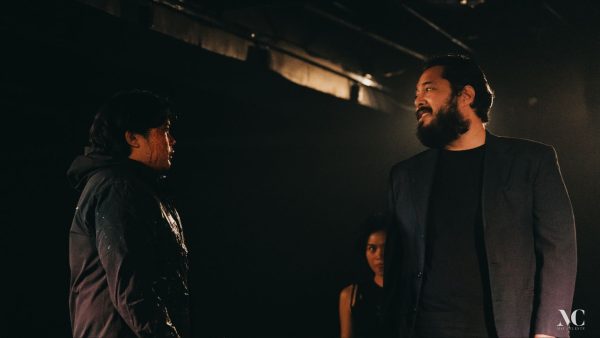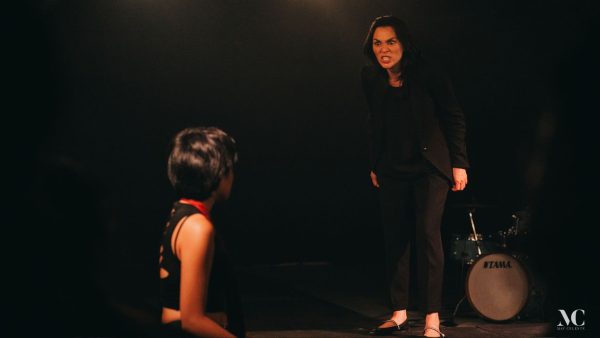
REVIEW: Raw and primal ‘Elecktra’ falls short of full tragedy
Despite some novel devices, this adaptation of the Greek tragedy falls short of the urgency and emotional weight that it aims for.
With such a lush history behind Greek plays and the myriad ways they’ve been interpreted and recontextualized, successfully staging one today often seems to hinge on the angle that one can bring to it. For this take on Sophocles’ Elecktra, director Nelsito Gomez (who also adapted the play for this production) goes minimalist and contemporary. The titular character’s plot to avenge the murder of her father—at the hands of her own mother and stepfather—is now depicted as both fully psychological and closer to the language of a present-day daughter scorned.
Done this way, Elecktra’s inevitable violence now clearly stems from the helplessness of these children failed by their adult guardians. However, at the same time, a disconnect persists between the production’s ideas and its execution. There’s a clashing of styles in its writing and performances that keeps it from achieving the urgency and emotional weight that a tragedy like this should possess.
Plain and Primal
To Gomez’s credit, keeping the play enclosed in one setting with most of the violence taking place offstage is an appropriate choice—seeing as the heroine’s actions are only guided by partial information and halfhearted commitment. And when Elecktra (played by Dippy Arceo) finally comes face-to-face with the targets of her vengeance, the plain stage almost seems to shrink in size alongside her confidence. Unfortunately, outside these tense moments, the ordinariness of the staging doesn’t give the actors much room to communicate their characters’ fraught relationship. The energy between them is still shy rather than familiar.

L-R: Ysh Bautista, Tarek El Tayech; Photo Credit: May Celeste
What often breaks through any awkward moments is Elecktra’s most novel and intriguing device: a drummer (Dani Arceo) situated opposite the stage, whose crashing cymbals and booming snare hits can take on a whole range of meanings. In one moment, the drums imitate a heartbeat; in others, they seem to be in conversation with the actors, like the gods attempting to intervene or a Greek chorus falling on deaf ears. And when blood is shed, the flurry of noise that erupts feels like triumph and anguish at once, expressed with primal, punk rock energy. This is the element that ends up capturing the production’s intense, youthful perspective best.
Articulating Revenge
In its broad strokes, Elecktra does manage to develop its central theme of revenge in a compelling way. What starts as a grand idea of justice eventually becomes something sadder and more desperate, as the circumstances surrounding Elecktra’s relationship with her father come to light and as Elecktra herself is revealed to be not as reliable a narrator as she initially lets on. Gomez’s script emphasizes the family dynamics that have led to this situation—every act of careless cruelty burrowing deep into the children’s psyche and warping their perception of right and wrong.
With that said, the language that Gomez’s script uses makes a bid for relatability and candidness but frequently comes across as too eager to be provocative. It isn’t just about the abundance of profanity, which gradually loses its edge; it’s that so much of the script is made up of characters simply explaining and describing the sordid details of the past to each other. And while understanding the full context is important, all this information is dispensed in such a way that just slows the story’s momentum. At a certain point, some characters sound more like tools to illustrate a theme instead of people actively responding to each other’s emotions.
An Internal Struggle
The actors portraying the tormented children in this story—Dippy Arceo, Dani Roque, and Ysh Bautista—clearly know how to get to places of darkness and to channel this through their bodies. But in a similar way to the script, the expression of these ideas can’t help but feel overly mannered and enunciated to the point of softening the anger and despair that should be coming through. There’s a spontaneity that’s still lacking in how they appear to process their characters’ own uneasy thoughts, making their impassioned cries come off more like measured declarations of how they’re meant to feel.

L-R: Dippy Arceo, Issa Litton; Photo Credit: May Celeste
Still, there is value in how these characters aren’t approached as mythical or grand literary figures but as kids out of their depth. The actors can’t help but seem more vulnerable especially around Tarek El Tayech—an imposing figure for every second that his smaller role gets him—and Issa Litton’s disdainful Clytaemnestra. You can feel the exasperation and resentment dripping off of her every word, as she wrestles between punishing her vengeful daughter or giving her even just a modicum of grace. This internal struggle of hers transcends the production’s modest limitations and briefly lets us glimpse this family’s full, tragic history.
Tickets: P500
Show Dates: Jul 25 – Aug 3 2025
Venue: The Mirror Theatre Studio, SJG Centre, Makati City
Running Time: approximately 1 hour (without intermission)
Creatives: Sophocles (Playwright), Nelsito Gomez (Adaptation, Direction), Sarah Facuri (Production Design), Rio Remof (Lighting Design), G Roi Reyno (Assistant Lighting Design)
Cast: Dippy Arceo, Dani Roque, Ysh Bautista, Issa Litton, Tarek El Tayech, Dani Arceo


Comments